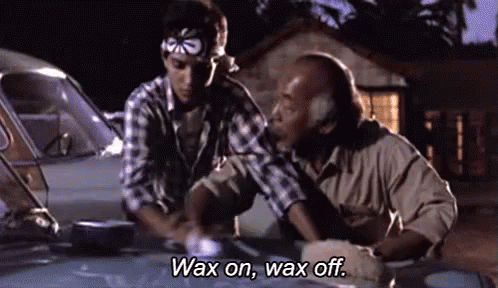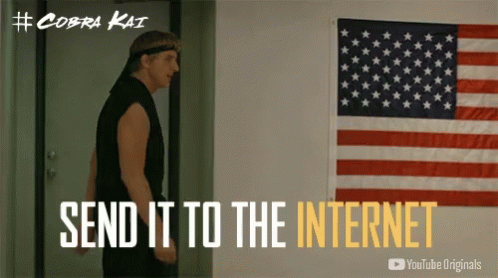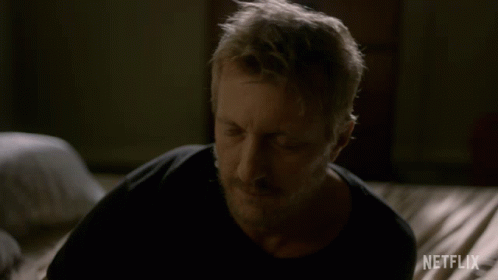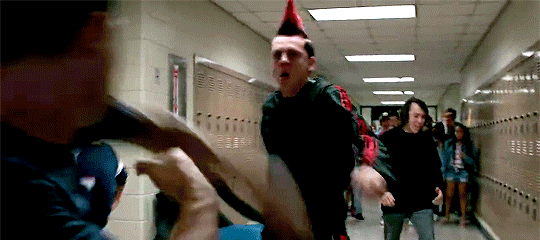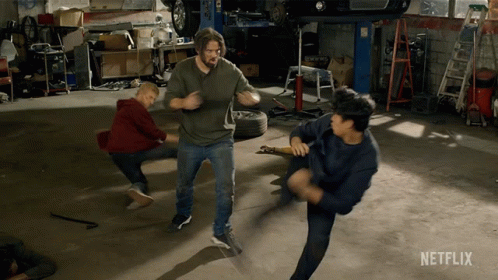The Karate Kid - The Legend Continues (Cobra Kai 2018-)
What we think about when we think about nostalgia
Please excuse the terrible banner on today’s newsletter; it was, for extremely stupid reasons, the best I could do.
An irritatingly wrong-headed take on the 1999 film Office Space landed in my inbox this morning, the opening salvo of an email newsletter that was actually about something else entirely. I read it and deleted it and moved on with my life.
JK LOL. That essay about Office Space, that annoying, stupid, wrong little essay, has been bugging me since I deleted it. Why was it wrong, why is it so annoying to me, and why am I still thinking about it? And, more broadly, how do we contend now with the pop culture that was meaningful to us when we were younger?
In the case of the essay about Office Space, the author argued that the themes of that film are no longer relevant because gosh, in this day and age of WFH and the gig economy, wouldn’t we all love a steady 9-5 job in a cubicle? How can any of us relate to Peter and his colleagues anymore, since that kind of job security is a thing of the past? The author’s take infuriated me because a) it’s based upon a fundamental misunderstanding of the film’s themes and ideas, b) overlooks the cultural context of the film, and c) just casually glosses over all that stuff anyway in favor of some glib hot-take about how nice it would be to have a job with benefits.
So, I’ve figured out why I’m annoyed. And I’ve pinpointed why it’s wrong. But… why am I still thinking about it?
I suppose the bulk of the problem boils down to someone being wrong on the internet, and my own fundamental inability to let things go. But beyond that: we’ve been watching the most recent season of Cobra Kai on Netflix, which in its own way is contending with the same questions the author of the essay about Office Space was trying to answer: does this bit of pop culture matter today for any reason besides nostalgia, and if so… how?
I haven’t really got a leg to stand on when it comes to wilfully misunderstanding themes or making glib, hand-waving generalisations about pop culture – see, e.g., this entire newsletter and the blog that preceded it. That’s kind of my whole schtick. Well, half of it. The other half of my schtick is writing wordy essays in which I overthink monster movies, so here we are. Let’s talk about Cobra Kai, and relevance, and nostalgia.
Like everyone* who was a kid in the 80s, I grew up with The Karate Kid (1984) as part of my cultural landscape. I don’t think I ever saw the full movie, beginning to end, until I was an adult, but I saw enough of it, enough times, to know it: Danny, a gangly kid from New Jersey (somewhere that was not California and also apparently inherently funny?) moves to Southern California, gets bullied by rich blond Johnny, learns karate, triumphs over the bully, and gets the girl (Johnny’s ex). “Wax on, wax off” entered the cultural landscape so profoundly that it will live in my brain, alongside the Doublemint Gum jingle and “Aawon Buwh?” until the day I die.
*yes, “everyone” being essentially white middle-class American kids; more about that later
A string of lesser sequels followed The Karate Kid’s success, followed in turn by a healthy dose of ironic 90s revisionism: kids of my generation, by then in their early 20s, sat around their dorm rooms at 2 am, shouting about how the real bully in Karate Kid wasn’t privileged Johnny Lawrence but scrappy Danny Larusso (a theory that later gained traction thanks to a widely circulated YouTube video). When my generation’s appetite for nostalgia overcame our youthful need to create intellectual and emotional distance between ourselves and things we associated with our childhoods, Will Smith came along and tried to reboot The Karate Kid (as a starring vehicle for his own son).
Which brings us to 2018, when YouTube decided to enter the scripted content market and greenlit a ten-episode sequel to The Karate Kid, featuring many of the original actors reprising their best-known roles. And, of course, there are new characters, notably Johnny’s and Danny’s kids. The series generated enough interest and enough viewers to get a second season and, eventually, to get picked up by Netflix, which has produced two more seasons.
The show itself is imperfect, and often outrageously silly (teenagers are constantly getting into violent karate riots, which the adults all firmly agree is unacceptable without really doing much about it.) And yet… I like Cobra Kai very much.
I should say, I like Cobra Kai very much, with qualifications: on the one hand, it’s a deeply sympathetic and thoughtful examination of middle-age disappointment, and wholly in conversation with its relationship with itself; on the other hand… well, I mentioned the whole outrageously silly thing already.
What makes Cobra Kai work is the central performances by its two adult leads. Ralph Macchio’s grown-up Danny is still a gangly dweeb; he just happens to be a wildly successful gangly dweeb, with a big house and a lot of money and a beautiful wife and two very, very privileged kids. Macchio brings real warmth to what could be a scolding, inflexible character; he loves karate because it made his life immeasurably better, but he’s also being forced to confront the reality of his own success: his kids are now the rich bullies, and his immense wealth gives him and his family a social and economic power which they wield thoughtlessly and occasionally cruelly. Danny, when forced to face the consequences of decisions he made as a kid and an adult, often finds himself surprised, baffled and disappointed.
William Zabka’s Johnny, meanwhile, has fallen far; he left the violent Cobra Kai dojo after his sensei tried to, uh, kill him (this is in the original movie? Because fluffy 80s movies got intense sometimes?), never got an education, partied a lot, had a kid out of wedlock (a kid who haaaates him) and now lives in a shitty apartment, works odd jobs and drinks too much. He too loves karate because it made his life better as a kid; like Danny, we learn that it gave him confidence at a time when he felt powerless. And, like Macchio, Zabka infuses his character with warmth; where Johnny could be a one-note loser, in Zabka’s hands he’s a deeply sympathetic person, one whose disappointment in himself and his life is so profound he can barely comprehend it. But he’s still able to empathise with the kids who come to him for guidance, and learn from them in turn.
Is it weird that the thing that really kicks my suspension of disbelief in the face is the fact that Johnny is in peak physical condition despite living entirely on a diet of manwiches and shitty beer?
At its best, the show pits Danny and Johnny against each other, either making them fight or forcing them to see beyond their decades-old rivalry and discover that they actually have a fair amount in common. They have the same arguments that the audience used to, about which one of them was the real bad guy back in ’84, and the show does a surprisingly good job balancing their points of view on the issue – and that’s without taking into account its introduction of the real villain, the sensei who once tried to strangle Johnny for losing a tournament, who returns and steals Johnny’s dojo out from under him.
The mythology of nostalgia is the driving force behind Cobra Kai: both the characters’ relationships with their younger selves, and our relationship with the films, as well as with our relationship with our relationship with the films. Nostalgia is a significant character driver for both men: Johnny initially drives the same car he’s had since he was young and hot, and Danny keeps Mr Miyagi’s house and car collection pristine and untouched. Nostalgia is similarly the reason why the show was greenlit; it (and curiosity, and good word-of-mouth) is also why we decided to watch it. Johnny and Danny’s evolving relationships with themselves and with each other and their history with each other is what makes the show special, and that in turn is in conversation with our own evolving understandings of ourselves, and of the films that informed our own adolesences. Perhaps I’m giving the show more credit than it deserves, but Cobra Kai really wants to explore these relationships, and despite its weaker elements, Cobra Kai is one of the better meditations on aging I’ve ever seen – in part because it is so willing to consider, and reconsider its own mythology, while asking its audience to do the same. The younger characters are allowed to make dumb mistakes; the adult characters, now living among the rubble of a lifetime of dumb mistakes, are constantly forced to confront the fact that they no longer have that luxury.
I’d add a gif of Mr Miyagi’s yellow car here but I can’t find a good one. Cobra Kai features the same car. The exact same car from the original film. Ralph Macchio still owns it.
By forcing its two heroes to reevaluate themselves and their histories, over and over, the show invites the audience to do the same: to consider the events of the original film within its initial cultural context, reconsider its meaning today, and confront the ways in which we’ve all changed and grown up. The stories we tell ourselves about our lives gloss over a lot of complexity, and rarely match up with anyone else’s perspective of the same events. Our cultural obsession with nostalgia, at its worst, permits us to look uncritically upon our own lives and upon the past. Cobra Kai, at its best, reminds us that it’s okay to be nostalgic about the past… as long as we’re also willing to be held accountable for it.
Well, that’s all the good stuff. Shall we talk about the silly stuff? The dumb stuff? The omg are they really having another karate riot, again stuff?
However beautifully developed are the male characters of Cobra Kai, the female characters are depressingly flat. Danny’s daughter Sam instantly falls into a love triangle plot and the show simply can’t find a way to give her any sort of character outside of it, to the point that a half-baked PTSD b-plot is pretty much all she gets after season 1. Danny’s wife and Johnny’s love-interest, the mother of his star student, don’t get to do much beyond worry that their kids are going to get hurt (…again), with an occasional foray into being disappointed in their men. There are only two other female characters worth mentioning, one of whom was written off the show after the second season and the other of whom mostly just exists to round that teenaged love-triangle thingie into a love quadrangle. Yaaaayyyyy.
Because Cobra Kai is a tv show that wants to go on for as long as possible, Danny and Johnny don’t get to share much screen time. They’re the show’s central romance, the actors have terrific chemistry, and it’s clear that the showrunners are worried about shipping bed death once they start working together. So the show is padded out with a lot – and I mean a lot - of teen angst and, uh, karate riots.
Don’t worry; none of these kids gets expelled.
And the aforementioned constant kid-on-kid violence is… it’s just ridiculous. The violence in Cobra Kia is regular – it’s a show about karate, after all - but laughably low-stakes. These highly trained, hyperemotional kids are regularly beating the shit out of each other, and somehow only two of them have even received anything approaching punishment. Despite the fact that the characters are constantly sporting bruises and open wounds, no one ever sustains any permanent damage. One karate riot ends with a main character in a coma. A coma. At one point, Johnny gets strangled again. And despite the regular karate riots, these kids are somehow all still allowed to hang out and go to school together and, uh, learn more karate.
Also, the show thinks it’s hilarious that Johnny doesn’t know how to use a computer.
Like many of the really popular movies from the 80s that I’ve covered in this series, I didn’t actually care about The Karate Kid at the time. I had no interest in karate, was too young to care about the romance, and the bullying Danny Larusso experienced was nothing like what I was going through at school -- which was, at the time, not even considered bullying. The Karate Kid, like The Goonies or The Lost Boys or Flight of the Navigator or ET or really any of the films we now consider classic kid movies of the 80s, was not a movie for me, a sensitive female weirdo who just wanted to be left alone. Yet I, like all members of the general 80s population who weren’t white and male, was expected to relate to the film regardless of the fact that it didn’t make any effort to relate to me and my experiences, because Danny Larusso’s story was understood to be universal, and therefore universally relatable.
I didn’t relate to it then. I didn’t especially relate to it when I rewatched the film about a decade ago. But… I really, really relate to Cobra Kai. Despite the terrible female characters, despite the weirdly toothless violence in a show that’s literally about violence, despite the show’s certainty that the height of hilarity is a grown man calling a hashtag a “hash brown” – beyond all that is a show that cares deeply about reckoning with the past and contextualising it, while trying to find a way to make it relevant to the present day. For a show that, basically, is about a couple of dudes dealing with the fact that their lives may have peaked in high school… Cobra Kai is at times a remarkably powerful show, even for a viewer like me, who never cared about the Karate Kid movies and isn’t, you know, a middle-aged man with daddy issues.
At least this particular karate riot was between actual adults, and everyone felt kind of weird about it afterward.
Monsters: THE PAST. Also, John Kreese. Dude is a straight-up villain, even with his backstory fleshed out.
Mullets: everyone’s present-day hairstyles are fairly unproblematic, but the 80s flashbacks are fun. Let’s instead talk about the fact that Sam and Tori are constantly fighting with their hair in their faces. The only time I’ve ever seriously considered shaving my head was back when I did aikido, because no matter how forcefully I pulled it back, nor how many bobby pins I used to keep it back, people were constantly (totally accidentally) yanking it out. That shit hurts.
Hookers, Victims, Doormats: see serious issues with every female character above, sigh.
Representation: Cobra Kai is definitely less white than the Karate Kid films, and Adult Danny himself is occasionally called out for cultural appropriation. So, like, I guess they’re trying?
Ruining my childhood by inches: Since first watching Cobra Kai, I’ve spent a fair amount of time thinking about what beloved 90s film deserves the same treatment. The only answer I’ve come up with is Clueless, even though Brittany Murphy has died and Clueless doesn’t have quite the same relationship with pop culture as the Karate Kid franchise. But a show that explores what Cher Horowitz is like as an adult, and her relationship with her past? Don’t tell me you’re not curious.
Or maybe, you know, Office Space.



